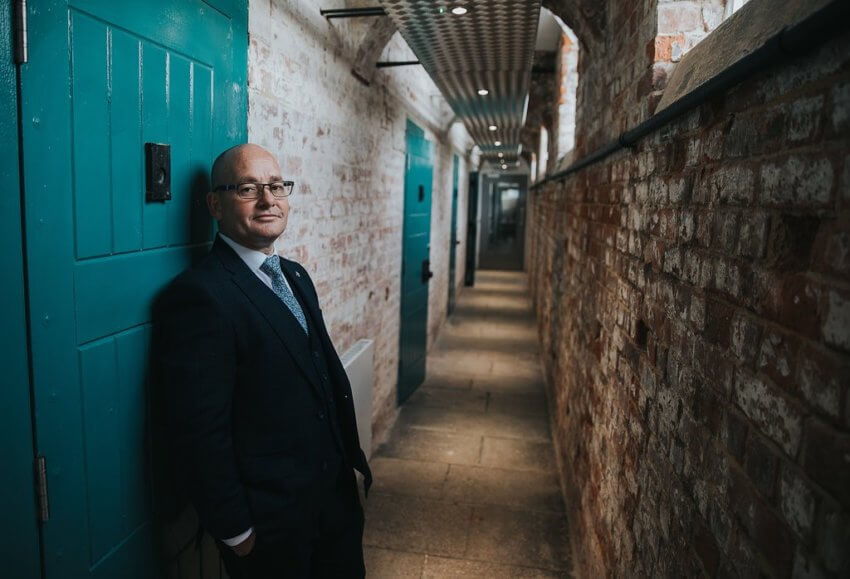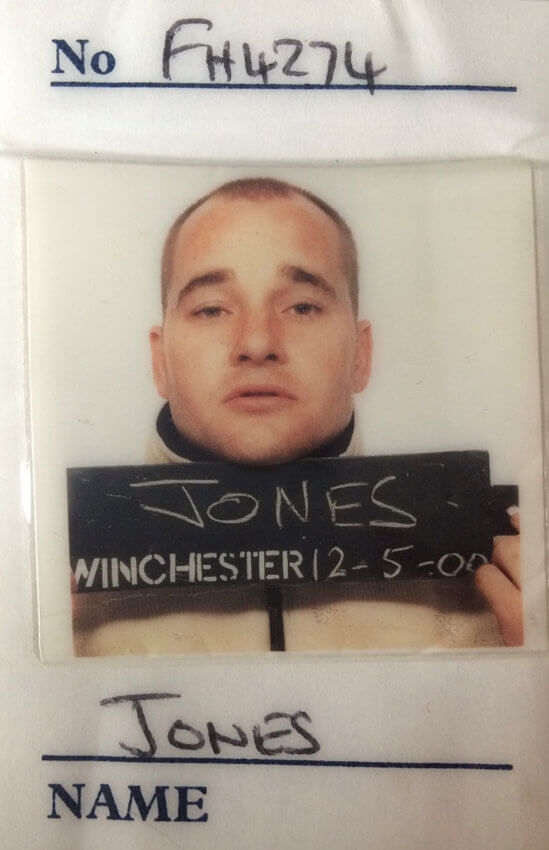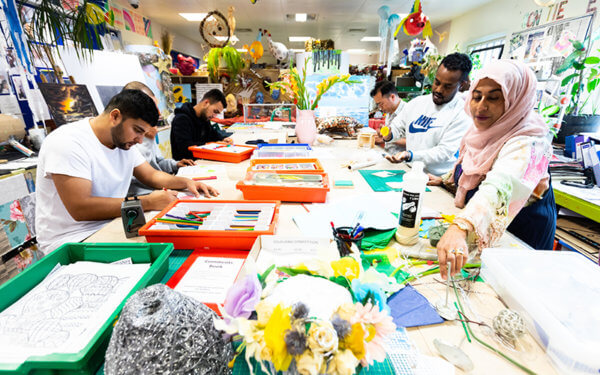Throwing the book won’t start a new chapter
Mitie works with founder of the Unlocking Potential consultancy, Gethin Jones, to design prison services focused on rehabilitation. In this article, Gethin shares unique insight on helping offenders turn over a new leaf, and reveals how good FM service delivery in prisons creates a positive ripple effect for prisoners.

Facilities management organisations working in prisons must appreciate how service delivery impacts people behind bars. A leading UK consultant in prisoner rehabilitation, Gethin Jones, is a firm believer in the role FM plays in preventing reoffending.
Chatting over coffee at Mitie’s headquarters in the Shard, Gethin admits there is a reason he knows the mindset of those with custodial sentences, and how to inspire their rehabilitation.
Gethin says: “Understanding why someone is offending is key to breaking their pattern of behaviour. Let’s imagine they witnessed their father’s drunk behaviour from a young age and went into foster care aged two after their mum walked out. By 11 this person is damaged and traumatised. They’ve been arrested for theft and appeared in court.
“At 13 they’ve already slept rough and learned to ease hunger with raw jelly that swells in the stomach. Their mid-teens roll around and now they’re stealing cars, burgling shops and houses, and smoking cannabis, alongside abusing alcohol and glue-sniffing.
“Onwards into their 20s, and they’re using heroin and crack cocaine, which they first tried during a previous prison sentence. They survive on cash from selling hard drugs to fellow users. By their mid-20s, they’ve destroyed every meaningful relationship they’ve ever had.
“Aged 29, they’ve been arrested for possessing an ounce of heroin, resulting in yet another custodial sentence. At four years, it’s their longest yet. I hope I’ve painted a realistic picture of the circumstances faced by many in the UK’s criminal justice system. In fact, I know it’s realistic, because as a former prisoner, every word relates to my own life.”
Breaking the cycle
Dressed in a sharp sports jacket and trendy steel-rimmed glasses, Gethin appears a far cry from the man he has just described. Indeed, he has come long way. Gethin is now clean from drugs, a proud dad-of-two, and a business owner and consultant who collaborates with Mitie and other organisations throughout the UK, USA and Australia.
By adopting Gethin’s approach, Mitie will help others follow in his footsteps. Of course, achieving such a turnaround is no mean feat. For Gethin, the milestone came when he received his four-year prison sentence.
He says: “Beginning that term, I thought I’d never be worth more than a council estate, a prison cell and a bag of drugs. When I got out of prison, I knew I was worth a lot more.
“What prompted the change in mindset? Attending a drug treatment programme was a huge help. Admittedly, my intentions weren’t entirely honourable; I thought if I could get a handle on heroin, I could just sell it rather than use it when I got out.
“One of the sessions was led by a former prisoner, who began sharing what his early life was like. I could identify with everything he said. Then he talked about his new life: having a flat, a family, a job and a driving licence. He was happy. My jaw hit the floor. He’d lit the fuse and my mind opened to the fact that change was possible – even for someone like me.”
Moving forward
On reflection, Gethin believes he was essentially an immature 12-year-old boy in the body of a man in his thirties. He was responsible for 56 offences, had 18 convictions and spent a total of eight years behind a prison wall. Besides help with drug dependency, the social and emotional support to understand the real causes of his behaviour proved life changing.
With Gethin’s guidance and expertise, this is the same approach Mitie uses in prison delivery to create environments that support rehabilitation. Speaking from experience, Gethin cautions that prisoners continue to face huge challenges ‘through the gate’.

Gethin says: “When I’d served the four years, although I was no longer dependent on drugs, my CV didn’t look great. I had no qualifications or work experience. I began volunteering for two hours a week with a charity that took young people sailing.
“They were the most uncomfortable hours I’ve ever spent. I only knew how to talk about prison, drugs and crime, while the others were chatting about holidays, mortgages and growing tomatoes. One day I got a boost of confidence when one of the young girls said: ‘I like it when you’re on the boat, Gethin. We have a laugh, but when stuff gets serious, you get things done.’ And that’s when I decided I was going to become a youth worker.”
No secret to success
Gethin worked hard to achieve the necessary experience and qualifications, and within seven years the two hours’ volunteering a week had progressed to a full-time role overseeing a team of 40 as a service manager for Portsmouth City Council. That’s when itchy feet struck, and Gethin decided to go it alone as a consultant, using his experience to help other offenders.
He says: “In 2016, I set up my consultancy, Unlocking Potential, aimed at showing prison officers how to support the journey of change. After a while I was asked to start working with prisoners as well. Things snowballed and now I have several major clients, including Mitie, who use my unique approach. I will be forever grateful for my new life.”
Six steps
Here Gethin describes the six steps he and Mitie use to support prisoner rehabilitation.
Give H.O.P.E
“‘Hearing Other People’s Experiences’ is a key part of the prison course I deliver for Mitie. Only when I met someone who had gone from a life inside, to becoming a valued member of society, did I believe it was possible. Hearing others’ success is powerful and inspires real change.”
Be positive
“Growing up in Portsmouth, I was told I was naughty at home, school and by social workers. No-one had anything good to say about me. Many offenders face the same. Those engaging with prisoners, from cleaners to prison directors, should see the good in them – and tell them about it. Don’t become part of a negative self-fulfilling prophecy.”
Prisoners are one person’s belief away from success
“People change people; those who helped my rehabilitation believed in me and paved the way to my longer-term success. When engaging with prisoners, have belief in their rehabilitation and their future outside of crime. You have to show them the door to a new life.”
Promote job skills
“FM organisations in prisons should build the provision of job skills and / or work experience into delivery. The FM teams can provide this on-site and it means that prisoners stand a much greater chance of finding a job upon their release. This reduces the likelihood of reoffending.”
Change means much more than that
“On countless occasions people in authority told me I needed to change. But change into what? I lived in a parallel universe to the rest of society. In fact, I had to create a whole new identity. Recognising the scale of the challenge, and implementing necessary support, is essential to help prisoners start over.”
Remember it’s not the system – it’s the people!
“It’s not the justice system that creates change, it’s the individuals who are privileged to work within it. Developing rewarding human relationships is essential. People who come into contact with prisoners, whether they be a prison officer, building technician or cleaner, should see a person, not a prisoner. And likewise, prisoners must see those around them as people who are just like them. When you level the playing field, amazing things can happen.”
Follow Gethin on LinkedIn and Twitter.
Read next
Get ready for facilities transformation
How can FM leaders face the challenging headwinds of today’s business world head-on? In the Mitie Science of Service® white paper, we set out to highlight the most pressing issues in facilities management, and…

Soft power is key to solid prisoner transformation
Over many years working with prisoners, I have never wavered from my belief in a restorative, rehabilitative culture. People may mutter about this being the soft approach, but I would argue to the contrary….

How facilities management unlocks prisoner potential through the gate
The days of transactional facilities management (FM) in prisons are long gone. Prisoner-focused delivery is shaping the sector, with the Ministry of Justice (MoJ) confirming a reduction in reoffending is one of its three…